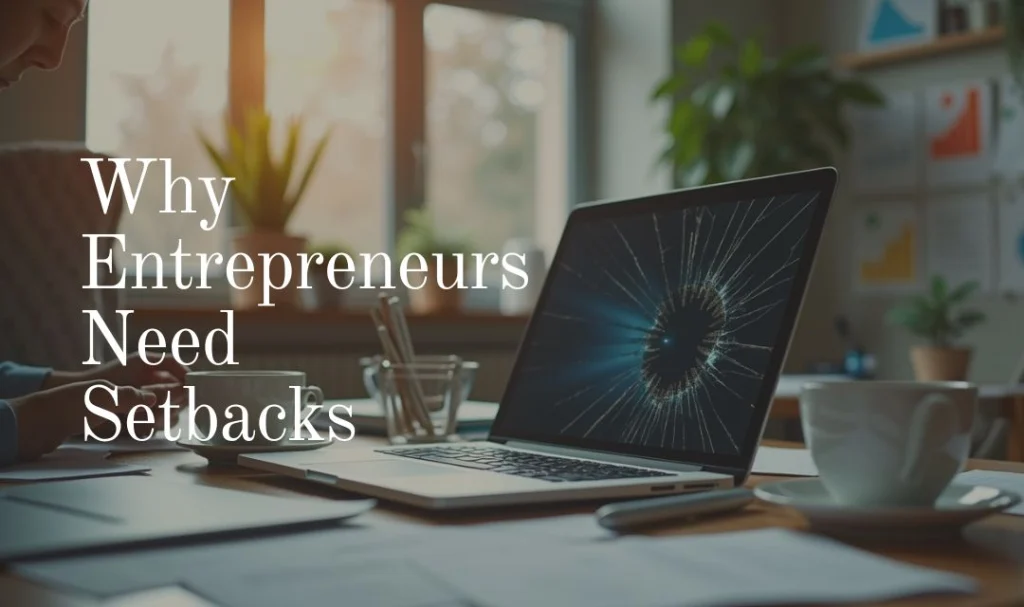Becoming a successful entrepreneur is a dream and a challenge. The path to success is never straight or simple. True entrepreneurial strength is built through setbacks, which serve not as roadblocks but as essential experiences that build resilience, spark innovation, and lay the foundation for lasting achievement. This article argues that entrepreneur’s setbacks are fundamental to entrepreneurial growth, shaping leaders who can thrive against all odds.
The stories of some of the most successful businesspeople are filled with struggles and ups and downs. They demonstrate resilience and, over time, learn to remain steadfast to achieve their highest goals.

The Power of Falling Forward
When you begin to dream outside the conventional 9 to 5 job, you must be prepared for challenges, highs, and lows. It is important to understand that failure is not a reflection of your intelligence or faith.
Failure is often misunderstood as the end of the road. In reality, it is the start of true growth. Entrepreneurs who have faced rejection, loss, or missteps know that each fall teaches something invaluable. These lessons cannot be learned in classrooms or strategy meetings. They come only through real-life entrepreneurial journey challenges.
Daniel Delisle, in INC. The Entrepreneur’s Playbook, shares business failure stories and calls entrepreneurship an “obstacle course that makes us grow as human beings first.” His words reflect a universal truth: growth comes not from comfort but from constant testing of vision, patience, and creativity. When entrepreneurs fall, they rise stronger, equipped with deeper insight and renewed determination.
Setbacks as the Best Teachers:
Everyone faces entrepreneurial journey challenges, times when it may seem like the end. However, setbacks serve as practical teachers. They reveal weaknesses, expose flawed assumptions, and teach entrepreneurs how to adapt in unpredictable circumstances. Learning from mistakes becomes the foundation of progress.
The book highlights the importance of failures in entrepreneurship and learning from others who have struggled with failure, as many of us do. Examples include Kevin Plank, founder of Under Armour, who faced rejections and trademark issues before building a global brand, and Guy Laliberté, a street performer who founded Cirque du Soleil after nearly going bankrupt. Their stories reveal a single truth: failure is not final; it is formative.
Every failure brings data. Each disappointment guides. Entrepreneurs who honestly review missteps often find insights that later shape success. Reflecting and recalibrating turns small mistakes into major breakthroughs.
Why Failure Fuels Innovation:
One reason people often overlook those who struggle is that they assume failure is final, rather than an opportunity to stand up and try again. However, there are many examples business failure stories that later turned into opportunities. Failure in entrepreneurship often ignites creativity; when one path collapses, entrepreneurs seek new solutions. When a product fails, they are pushed to design something better.
Think of Reed Hastings, whose frustration with late DVD fees led to the creation of Netflix, or James Dyson, who developed over 5,000 prototypes before inventing the bagless vacuum cleaner. These entrepreneurs didn’t stumble upon success by accident; they persisted through frustration, used failure as feedback, and turned adversity into opportunity.
As The Entrepreneur’s Playbook notes, every challenge faced by a founder “redefines your understanding of success and failure.” Setbacks are not simply challenges. They are creative catalysts. They test conviction, sharpen focus, and encourage innovative thinking. Comfort zones cannot offer this.
Building Mental Strength Through Adversity:
Giving up and failing to show up on important days introduces adversity. On the other hand, entrepreneurial setbacks build one essential quality every leader needs: mental endurance. The path is isolating and uncertain, often filled with self-doubt and fatigue. Those who persevere through their hardest seasons develop the strength to handle future crises with clarity and composure.
One important aspect of struggling with and overcoming setbacks is building resilience. Experts agree that resilience is not innate; it is cultivated by facing adversity, reflecting, and rebuilding. Entrepreneurs who embrace difficulties learn to stay grounded during chaos. They build teams that can withstand market changes, financial challenges, or unexpected shifts, as many did during the pandemic.
As Delisle reflects in his book, entrepreneurship is “a lifestyle that requires passion, dedication, and an unwavering belief in one’s vision.” When leaders internalize this, they stop viewing problems as punishments and start seeing them as practice.
Transforming Challenges into Strategy:
The author emphasizes that business challenges and setbacks are not only key for learning; they also provide opportunities for leaders to strategize and find new approaches—ideas connected to previous themes of insight and adaptability.
When something fails, they ask why. When a deal collapses, they study what went wrong. This mindset turns short-term pain into long-term planning.
Overcoming business challenges often requires shifting one’s perspective from a state of victimhood to one of growth. Each obstacle presents an opportunity to refine processes, enhance the customer experience, or redesign products. A setback is not a stop sign; it is a signal to adjust your strategy.
In summary, entrepreneurial journey challenges should not be feared; they must be embraced as the essential tests that develop strength, insight, and leadership. Recognizing setbacks as foundational shifts the mindset from avoidance to growth. Ultimately, these obstacles are what shape entrepreneurs into successful, resilient leaders.
As INC. The Entrepreneur’s Playbook reminds us, entrepreneurship is about personal growth as much as business success. Failures and restarts aren’t weaknesses; they are signs of progress.

